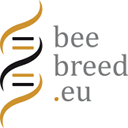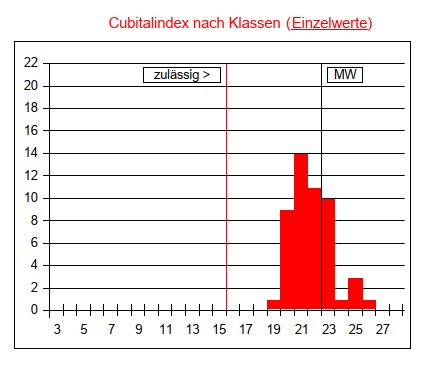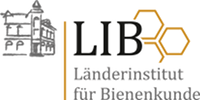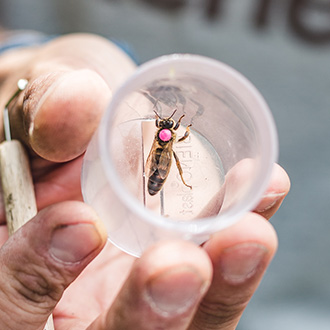For the future of our bees
We have been breeding queen bees for many years, thus contributing to a strong and healthy honey bee population.
Our breeding group consists of experienced and committed breeders from all over Austria. The data of the breeders can be found in the breeding database beeBreed and can be traced back over generations.
Worldwide leading in bee genetics
With 15,000 bee colonies, we are the largest Carnica breeding and testing operation in the world. The high number of test colonies is a decisive advantage in the selection of the best genetics. I am convinced that we have the best genetics on our farm, otherwise we would use different ones.
We try to preserve and further develop the old Austrian lines in Carnica breeding(Wintersbach, Troiseck, Peschetz, Bukovsek, C1, Putz etc.). A special focus in our beekeeping is the selection for varroa tolerance. The method of our performance testing is described in the AGT method manual. Over the years, we have succeeded in selecting breeding mothers that are highly resistant to the Varroa mite, require hardly any treatment and pass this ability on to their daughters. Not all lines are equally advanced in their varroa tolerance, but we are still trying to make the lines resistant to varroa on their own. A very high varroa tolerance has already been achieved, but varroa control is necessary for further breeding in order to recognize and select the better colonies. If the daughters of our queens are not further selected, the genetic Varroa defense is lost through outcrossing.
Another focus of our selection is the vitality of the bee colonies: this is demonstrated by a particularly high honey yield and resistance to diseases. Our breeding colonies are tested for American foulbrood, acute and chronic bee paralysis virus, chalkbrood and other diseases and are only propagated if the results are negative. The breeding colonies are also tested for the typical Carnica breed characteristics. The tendency to swarm has been almost non-existent for years, so swarm control is no longer carried out on our farm. Gentleness is an important characteristic of our bee colonies, as our employees work with the colonies all day and aggressive colonies would be too dangerous. We generally work without protective clothing and with very little smoke.
Studbook
All breedings, lines and results are documented in our studbook.
We make the studbook publicly available here. In this way, all interested beekeepers can find out about our breeding results.

Insight into our genetics
Public access to the BeeBreed breeding database
The BeeBreed database is publicly accessible. You can view all our queens, their pedigree and the values of the performance test there.

Results of feature analysis
Since 2010, recognized trait testing centers have been recording and archiving all body traits that are important for the selection process in a central database at the State Institute for Apiculture (LIB) in Hohen Neuendorf. The trait program uses D.I.B. breeding guidelines to determine whether or not a colony is suitable for breeding. The results are automatically transferred to the online studbook of the
breeder/examiner at www.beebreed.eu.
We are publishing the results of our 2021 trait survey here.

Example of an evaluation of the feature analysis.



